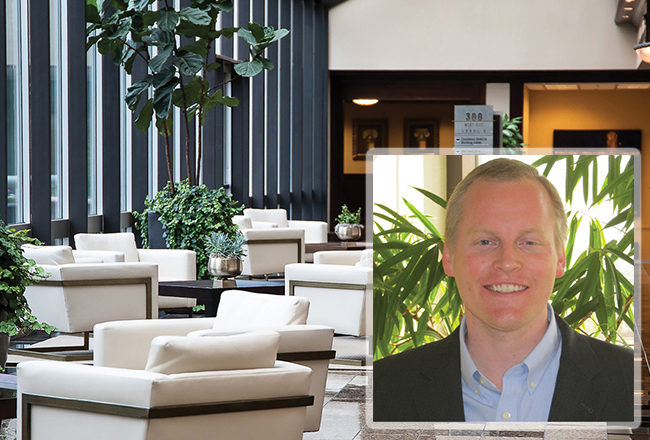Suite Talk: Mark VanStekelenburg, managing director of CBRE Hotels’ Consulting
 When the COVID-19 pandemic began to metastasize, the hotel industry saw its viability evaporate almost overnight. But as states begin to reopen their economies and Americans are eager to resume a pre-pandemic degree of normalcy, where does the hotel industry go from here?
When the COVID-19 pandemic began to metastasize, the hotel industry saw its viability evaporate almost overnight. But as states begin to reopen their economies and Americans are eager to resume a pre-pandemic degree of normalcy, where does the hotel industry go from here?
In this edition of Suite Talk, Business Journal Senior Enterprise Editor Phil Hall speaks with Mark VanStekelenburg, managing director of CBRE Hotels”™ Consulting, on the state of the hotel industry.
We”™re four months into the pandemic. How is the hotel industry holding up?
“We are starting to see some green shoots. The hotel market bottomed out at about 21% occupancy back in April. Since then, we”™ve continued to see some growth, but this is the most drastically impacted year of hotel performance since we”™ve been tracking the industry since the early 1900s.
“At this stage, our forecast is about a 52% RevPar (revenue per available room) decline for 2020. And that is significantly greater than what we saw in 2001 and after the great financial crisis.”
Other industries, most notably retail and restaurants, have been scarred during these past few months with announcements of bankruptcies and location closings. Has anyone in the hotel industry declared bankruptcy or started proceedings to go out of business?
“We”™ve seen very little of that. The mantra within the hotel industry has been ”˜Let”™s figure out what we”™re dealing with.”™ For the time being, everyone appears to be largely working together to address various forms of forbearance and the ability to tap into public programs in order to keep the hotel asset viable.
“Still, the pressure continues to mount as this continues to drag on. But, so far within the hotel industry, the amount of default has been relatively low because of the amount of forbearance that is happening.”
Where do you see the hotel industry going for the second half of the year, as the states are reopening their economies and people might start thinking about summer or autumn vacations?
“We”™re forecasting a delayed recovery. Leisure demand is driving the initial recovery as restrictions continue to ease around the country. We are continuing to see that ramp up until additional measures are put in place that allow hotels to go back up to full occupancy ”” or a cure or vaccine is identified.
“The hotel industry will continue to be heavily challenged over and above just the rooms product. You have a lot of full-service hotels and luxury hotels and convention hotels that have significant nonroom areas of their hotel. Those typically are not as profitable or don”™t contribute as much to profit as the rooms. It”™s similar to the challenges the restaurant world is facing and we think that that will add to some delayed recovery.
“The other revenues and operations at hotels are still very much to be determined ”” whether many of the hotels that were temporarily closed will start reopening or will reopening with limited or no food and beverage, for example.”
But doesn”™t that dilute the appeal of going to a hotel if there is no food or beverage service?
“We”™ve seen creative ways to combat that. Hotels are tapping into delivery networks and bringing the food to the guest room. We”™ve also seen creative ways of in-room dining, where you almost have restaurants set up in the guest room. Again, obviously, that depends on the size of the guest room.
“As for hotels with multiple restaurants and significant banquet space and nightclubs, it remains to be seen still how and when those will fully reopen ”” especially for hotels that thrive on dense events with loud music and a lot of things going on. There isn”™t an avenue yet to do that right now.”
In your opinion, who do you think is going to come out of this in a stronger position: the big hotel chains or the boutique hotels?
“I think it depends ”” and sorry for that answer, but every hotel company and every independent hotel is a unique situation. It all depends on how much of the operation was shut down and what the reopening looks like. At the end of the day, liquidity is king. So, the better-capitalized hotel companies are going to be in a position to provide the services that they were providing.”
What does this situation do for cities that rely very heavily on the hotel industry for its economy? I”™m thinking of New York, Orlando, San Diego and Las Vegas, which attract both massive convention business activity as well as an equally impressive number of tourists. Do you think that the current situation is going to force these cities to maybe rethink putting too much emphasis on tourism and business travel as a main source of their economies?
“I think certainly in the short- to mid-term there may be some pain in those areas. I think any city that relies significantly on convention and large groups will be more challenged. With many of these cities, international demand plays a significant role ”” they can contribute up to 50% or more of the rooms. That”™ll be a significant hole to fill until international travel comes back and until large conventions come back.
“We are still seeing some activity in the latter part of this year for that and haven”™t seen any significant wave of cancellations for 2021. But the first part of this year and into the summer, just about everything has been deferred to either later this year or next year. We have seen some outright cancellations, but typically everything is in a deferral.”